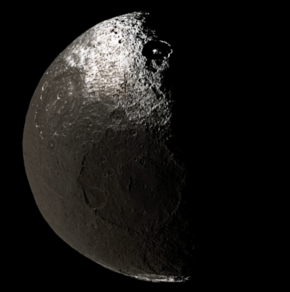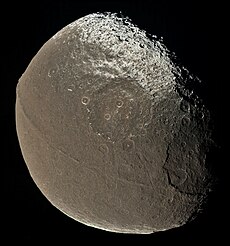Roland (crater)
 | |
| Feature type | Impact crater |
|---|---|
| Location | Iapetus |
| Coordinates | 73°18′N 25°12′W / 73.30°N 25.20°W[2] |
| Diameter | 144 km |
| Eponym | Roland of Song of Roland |

Roland is a 144 km (89-mile)-wide crater near the north pole of Iapetus, a moon of the planet Saturn.[2] It lies inside one of the bright areas on Iapetus called Roncevaux Terra. Images of Roland shows that it has a central peak.
It is named after Roland, the titular main character and protagonist of the Song of Roland, a medieval epic poem.[2] All other surface features on Iapetus are named after characters of this poem.[3]
Exploration
[edit]No high resolution image of Iapetus's north pole has been taken up to date. This makes it difficult to make a highly detailed map of Roland.

The first probe to photograph Roland was Voyager 2, which passed by the north pole of Iapetus on 22 August 1981, during its flyby of Saturn.[4]
The latest mission to visit Saturn was the Cassini spacecraft which arrived at Saturn starting on 1 July 2004.[5] It provided the clearest and best images of Roland during its scheduled flyby on November 12, 2005.[1]
See also
[edit]References
[edit]- ^ a b "A Moon with Two Dark Sides". NASA. 26 December 2005. Retrieved 15 July 2024.
- ^ a b c "Roland". Gazetteer of Planetary Nomenclature. USGS Astrogeology Research Program. (Center Latitude: 73.30°, Center Longitude: 25.20°; Planetographic, +West)
- ^ "Iapetus". NASA. January 2024. Retrieved 15 July 2024.
- ^ https://nssdc.gsfc.nasa.gov/imgcat/html/object_page/vg2_4391335.html
- ^ https://science.nasa.gov/mission/cassini/the-journey/timeline/
